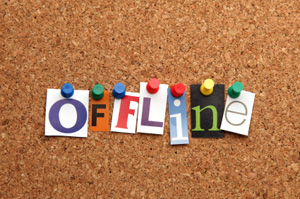If you’ve been in pay per click for a while, you’ve probably experienced it. I’m talking about that horrible, horrible time when one or more of your PPC accounts goes offline. It’s always bad. You end up losing valuable conversions, profit, account history, and your competitive edge. It can set you back in your PPC career. Sometimes, you can even go dark during a critical period such as holiday shopping. Today, I’m going to share a few tips so you avoid going offline, can sleep better at night, and look like an absolute PPC rock star!
Tip 1: Remember A Backup Credit Card

One of my favorite features within Google AdWords is the ability to enter a backup credit card. At one time or another, it’s likely your primary card is going to fail. If you have a backup card, you have a great chance of staying online while avoiding downtime. Just remember to make sure your backup card is a completely different card (and credit card company) from your primary one. For example, if my primary card is American Express, I’ll make sure to have a Visa or MasterCard backup.
Also, remember to have a high credit limit on both your primary and backup card. A backup card is no good if it has a low credit limit and cannot handle large charges that may have failed on your primary card. Make sure to have enough credit to last at least a week in case the issues on your primary card take some time to figure out.
When it comes to adCenter, you cannot have a backup card go into affect automatically like Google AdWords. However, you can have a backup card ready to go. If your primary card fails, just manually switch over to your backup card.
Tip 2: Consider Pre-Pay Billing
If you’re a credit card advertiser, you may wish to consider pre-pay versus post-pay billing. Pre-pay means your credit card is charged before you spend the money. If you always make sure to have a large, positive balance in your search engine account, you will always stay online. However, this can have an impact on your cash flow if you’re spending tons of money. For that reason, I personally prefer post-pay with a backup card in place. Sometimes, since you can’t automatically switch over to a backup card in adCenter, I’ll consider pre-pay on adCenter but have a post-pay on AdWords with a backup card in place.
Tip 3: Consider Transitioning Over To Invoicing
If you’re a credit card advertiser, you are more at risk of going offline. Credit cards fail and billing systems can have issues. If you move over to invoicing, you’ll lose your valuable credit card rewards, but will pick up peace of mind. It’s much harder for an invoiced account to go offline due to billing issues. Moreover, you have a full 30 days from the end of the invoiced month (typically net 30 terms) to pay your bills. The downside? This option only works if you’re a larger advertiser and are able to negotiate a strong credit limit with the search engines.
Tip 4: Leverage Automated and Manual Monitoring
Work with your IT department to get a system in place that pings Google, Yahoo!, and Bing to make sure your ads are showing up. If you are not showing up for some reason, generate an alert. The best alerts are not only via email but involve an escalation path (with phone numbers). It’s easy to miss an email in the middle of the night, but you’ll be able to respond right away if you get a call.
Moreover, have your entire team (both your internal team and your search engine reps) check your ads constantly. I try to check my ads once per hour, 24/7 (except when I’m sleeping). This is part of my Six Essential PPC Campaign Checks. If there’s an issue, make sure a clear escalation path is in place. Also, make sure you have the cell phone numbers for your entire team and your search engine reps. There are times when I’ve gotten calls in the middle of the night and I always appreciate it if it’s going to prevent a major disaster. Best of luck in having 0% unintended downtime for your PPC campaigns!
Image of Offline © iStockPhoto – mattjeacock

Great article! I can attest to the phone calls you’ve received in the middle of the night – and how detailed your escalation path is. It’s important that teams plan for these scenarios rather than spend days crippled with downtime.
Thanks so much, Nicole! 🙂 You are the best wife ever.